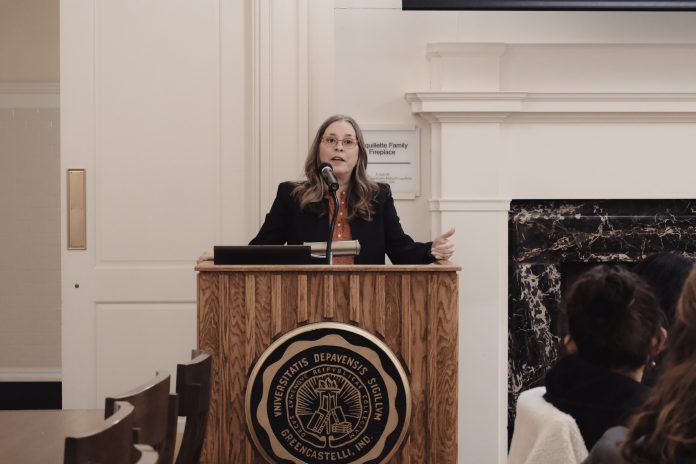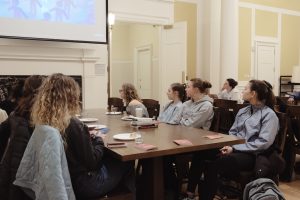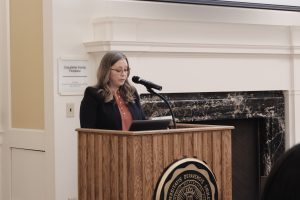
Why should another person’s rights matter to you? Dr. Carrie Booth Walling, director of The Human Rights Program of the University of Minnesota, visited DePauw on Feb. 5 to answer that exact question. The lecture was held in Wallace Stewart, where students, professors and alumni joined together to listen and participate.
To answer her question, Walling provided six points to follow along.
Firstly, human rights are about equal dignity for all. Walling defined human rights as rights that every human has by being born and that are necessary for a life of dignity. She called for these rights to be universal, equal and inalienable. She believes that our rights travel with us, no matter where we reside, which lands we cross, or what leaders are in power.
Next, she explained that all human rights are interconnected—in order to enjoy one of our rights, we need all of them. Walling demonstrated this with personal experience in Flint, Michigan, when it was discovered in 2014-2015 that lead was in drinking water. This was mainly caused by local leaders' decision to switch their drinking water to a different source despite opposition. This small choice threatened the right to water and overall health, which Walling believed was compounded by preexisting racial, economic and environmental imbalances. “The violation of one set of rights initiated a chain reaction, triggering the violation of other rights,” Walling said.
Walling explained further, “Investing in the well-being of others increases our own security, safety and well-being.” She stated how our rights are not just connected within ourselves but connected with each other. Treating others with dignity and respect does not diminish our dignity, but rather it increases it. We are all tied together through our experiences. “Protecting the rights of others is not only a moral obligation, but it is essential for building a prosperous society for all,” she said.


In her fourth point, Walling pointed out that human rights are not partisan. They are political but not designed to privilege any person, group, government or political party. No human rights belong to a singular group of people. Walling affirmed that human rights require that we honor human dignity, even to those who do not do the same for others. She elaborated, “Protecting human rights may sometimes require confrontation or political contestation, but it is the principal approach where the means matter as much as the ends.”
Walling said that the fifth point is a hard truth but is truth nonetheless. Human rights violations are policy decisions. They do not just happen, but rather they emerge from policy choices adopted by government leaders. Whether the violations give leaders economic advantages or impose stability, these are choices made. Walling states how healthy democracies address past violations in order to not repeat what has occurred.
Ending on a positive note, Walling emphasized that ordinary people have an extraordinary capacity to advocate for human rights. The reality is that change happens because ordinary people have the strength and courage to defend human rights. Walling gave many examples of different human rights advocates who helped create new protections for people around the globe. These people were simply “doing their peace” in the community. “When bystanders become upstanders, it changes the outcome for the neighbor, the neighborhood and the community,” Walling said.
Walling ended the lecture with a poem called “The Person Next to You” to encourage the audience to reflect on the people around them and their shared responsibility in upholding human dignity.
